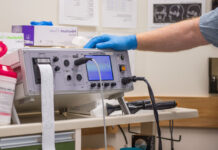In this blog, an anonymous survivor of electroconvulsive therapy (ECT) reflects on a recent presentation by a psychiatrist who defends its use.
Living with cognitive impairment from ECT for many years has been confusing and hard to move on from. Like most ECT patients, I wasn’t informed that problems learning new information or with working memory were an ECT side effect and wasn’t looking for it. I failed to see a pattern in my day-to-day life because I lacked the ability and information to do that. Most of the time, I’m unaware of what I don’t remember, but with hindsight there were clues, if only someone had followed up with me or my family or had warned of it.
ECT survivors and their supporters regard this damage to memory and cognitive abilities as brain damage, using the ordinary meaning of the words i.e., the brain is no longer able to perform tasks that it did before ECT. This is supported by fMRI and autopsy evidence. ECT proponents insist the damage doesn’t meet their definition of brain injury (it’s too microscopic and diffuse to be observed on structural scans like MRI using today’s technology). Proponents insist that this damage to cognition and memory is labelled ‘functional impairment’, which is hard for survivors to swallow as it feels as if it downplays a life-changing disability that a lay person would call brain injury.
We’ve found it hard to understand why ECT patients are still not warned about the risk of permanent cognitive impairment and anterograde amnesia (ie, loss of working memory and ability to make new memories etc). We thought there might be answers in a talk by Dr Sameer Jauhar at the Birmingham Medical Institute on Tuesday 10th January 2023. He is a well-known proponent of ECT, and spoke against the motion ‘This house believes that ECT has no place in modern medicine’ in the Maudsley Debate series on May 15th 2019.
Understanding the talk in real time wasn’t realistic with memory impairment so, as in day-to-day life, I was reliant on audio playback, notes and help from family and friends.
The first part of the talk was Dr Jauhar’s rebuttal of studies into the lack of data on safety and long term follow-up of ECT (identified by Professor John Read and colleagues), and a discussion of why meta-analyses comparing ECT with other treatments (ie ECT versus transcranial magnetic stimulation, or unilateral ECT versus bilateral ECT and so on) are, according to Dr Jauhar, superior to studies comparing ECT with sham ECT, as collated by Professor Read. In these, some patients are given an anaesthetic but no electric current is used, in order to see whether ECT produces better results than placebo.
‘Sham ECT’ studies are difficult to do because of tell-tale post-ECT confusion which may enable patients and observers to work out who has actually had ECT, but the absence of good quality placebo controlled studies for ECT feels to us as though proponents are relying on studies that are comparing one kind of assault on the brain with another, and are ignoring negative impacts of ECT that are critical to patients and their families.
The discussion of these studies by Dr Jauhar went over my head, unsurprisingly, as despite my pre-ECT education, I struggle with information. However, as far as Dr Jauhar was concerned, ECT is proven effective and the concerns raised by Professor Read and his colleagues were unfair, incorrect, risked putting patients off a helpful treatment, and could even lead to ECT being made unavailable by regulators.
Dr Jauhar did point out that studies are concerned with the average effect, and that within a group, there will be individuals who can have an unfortunate negative outcome as well as those with positive outcomes. He felt that it was the responsibility of the doctor giving ECT to monitor their patients and help those who had a negative outcome. My own experience was of poor monitoring and a complete absence of follow-up or help to identify the cognitive deficit I was left with, let alone to address it. That seems to be a common experience from survivor accounts.
Logically, survivor experiences like mine are unfortunate negative outliers to Dr Jauhar, and not a reason to put other patients off ECT who might have a positive experience. To a harmed survivor, that feels like saying that my severe permanent loss is supposed to be balanced out by the hope that a few other unknown patients might get some short-lived relief. My severe permanent ECT side effects don’t seem to be unusual, according to other survivors.
My feeling is that this heterogeneity of patient outcomes, which proponents are well aware of, gets missed out when information is produced for public consumption. Severely negative outcomes become invisible and completely unheard. The general population is told the simplistic line that ECT is effective and safe, rather than that ECT may be temporarily effective for some patients but permanently disastrous for others.
Dr Jauhar didn’t disagree that relapse rates after ECT are high – so it can’t be considered effective in the long term – but to him, that doesn’t seem to be a barrier to using ECT, because relapse rates from drug studies etc are also high.
Dr Jauhar confirmed that the long-term impacts, apart from relapse, were not addressed by psychiatric research or considered in ECT safety reviews, but according to him that was understandable because that is how medical research is done. This seems odd, because surely patients would have an expectation, as I did, that if someone claims a treatment is safe, there are no significant long-term risks.
Dr Jauhar stated that it was difficult to find a fair comparison group for studies that look at the mortality rate after ECT. However, he claimed that in studies where the comparison group was ‘carefully chosen’, ECT didn’t have a high mortality risk. It is difficult for a lay person to see ‘careful selection’ as anything other than interfering with the data to get a more favourable result that makes ECT appear less dangerous.
He then discussed the critical issue of cognitive side effects. According to Dr Jauhar, on most measures of memory and cognition there is no negative impact to be found a few days after ECT. This is the basis for the statement that ECT survivors are used to hearing from their doctors when they try to get help post-ECT: ‘Memory loss from ECT is only mild and temporary’. However, Dr Jauhar was honest in admitting that the studies didn’t address the effect on autobiographical (memories about a person’s own life), retrograde (memories from before the ECT) or anterograde memory issues (problems making new memories), because these are more difficult to study and assess, and trials don’t examine the long-term impact of these memory deficits or the effect on people’s lives.
He held up the well-publicised accounts of Dr Tania Gergel and Dr Rebecca Lawrence as examples of patients who have described how they have benefited from ECT and are still able to function and work. Dr Jauhar said that he often uses their accounts to reassure patients, which from a harmed patient perspective feels disingenuous because he was content to dismiss negative patient experiences as outliers. I believe that patients who are considering whether to have ECT should be made aware of the range of common outcomes from ECT, and not just those that are positive or short-term. Other ECT survivors would point to many published accounts of ECT where loss of cognitive function has been devastating. For many, the damage to autobiographical memory is particularly significant. Remembering our personal history is our sense of self and connection to the world and people around us, and to lose it is not easy to bear. For me, the loss of anterograde memory has been disastrous, as my identity was built on my intellectual ability.
Dr Jauhar said he had seen ECT work many times and that as far as he is concerned ‘ECT is the best of a bad deal for a proportion of the patients we deal with’. He argued that future research about cognitive effects of ECT should focus on trying to identify which patients are likely to be at higher risk of cognitive impairment, for example by using scans, so it can be prescribed more accurately. He said that within a group of patients some people have good responses to psychiatric treatment but acknowledged that some have ‘horrendous responses’ and an important aim for research is to predict who should have treatment.
This is what we took away:
– When ECT proponents say ‘ECT works’, they are basing that statement on how much immediate improvement they perceive in their patients, and not on the patient’s experience in later months when they are trying to resume normal activity. They are also referring to very short trials comparing ECT to drugs or to transcranial magnetic stimulation (TMS), or to other kinds of ECT, and not on, say, ECT compared to compassionate care and watchful waiting. This is likely to give a misleading impression of what they mean by ‘working’ because it doesn’t take into account how the patient functions after being discharged from ECT.
– The measures of cognitive impairment that ECT proponents use to make a judgement on whether memory damage is significant don’t include factors that are important to survivors suffering long-term impairment – typically, autobiographical and anterograde memory disability.
– ECT proponents are focused on the very short time window when ECT is being carried out, and they feel that is acceptable because it’s the same approach used for drug trials etc.
– ECT proponents don’t want to lose access to ECT, or to make patients less likely to consent. This means that heterogeneous outcomes of studies, missing data on some key aspects of memory (eg anterograde and autobiographical), and the lack of long-term follow-up are oversimplified into blanket, pervasive messaging to the press, public and patients that focuses on the benefits, understates the risks and unknowns, and doesn’t mention the permanent memory impairment experienced by many survivors.
– This leads to an ongoing problem of patients not being informed about cognitive risks from ECT and what life is like for survivors who suffer significant long-term impairment.
– In addition, patients who do suffer cognitive impairment are left unsupported and unheard, because as far as the medical establishment is concerned, our experiences don’t happen and the damage we live with is functional/hysterical/unusual/easily attributed to mental health problems, rather than being a relatively common, expected and devastating side effect of ECT.
How can both sides be brought closer together? There is distrust on the side of injured patients who feel betrayed and let down because of lack of informed consent and post-injury support, and on the side of ECT proponents, who believe that calls for better patient information are driven by ideology and ignorance.
There is a power difference between harmed patients and ECT prescribers, which was reflected in comments made by psychiatrists during Dr Jauhar’s Q & A. Incredulity was expressed that any lay person could be an expert into the workings of their own mind. Harmed ECT survivors are routinely gaslit and their accounts of injury are either undermined and attacked, or completely ignored by ECT proponents, whereas ECT prescribers have easy access to platforms to promote their views, and the status to ensure that they are seen as more credible than those trying to raise concerns and ask for help.
How can doctors be less paternalistic and ensure that potential ECT patients give informed consent to treatment, with a full understanding of the risks, and have access to support afterwards to live with ongoing cognitive impairment?
It is very difficult for harmed ECT survivors to get the support they need. We can’t help feeling that psychiatry hasn’t started to catch up with modern thinking on patient safety, such as the Cumberlege Report. This is why a group of campaigners is calling for an independent review into the practice of ECT.
Dr Jauhar suggested that these calls for investigations into the safety of ECT were driven by ideology. We feel that psychiatry hasn’t engaged with harmed patients, and the lack of informed consent to an intervention that may cause brain injury has been deferred for far too long.
Postscript
It has been a few days since I started listening to Dr Jauhar’s talk and trying to engage with friends and family who have been trying to help me write something cogent. The pounding headaches, exhaustion, nausea and dizziness from this cognitive effort, which I know from experience will take time to subside, will be familiar to many people living with brain injury, and illustrate what life is like for an ECT survivor even many years later.
Further reading on the debate about ECT
Psychiatrists including Dr Jauhar defend the use of ECT here: ‘Electroconvulsive therapy for depression: 80 years of progress’
Professor Read and colleagues respond to this defence here: ‘A response to yet another defence of ECT in the absence of robust efficacy and safety evidence’
Professor Read discusses why ECT is still used, despite lack of evidence for its effectiveness here: ‘Shocked: with evidence for efficacy so thin, and the stakes so high, why is ‘electroshock’ therapy still a mainstay of psychiatry?’
More coverage from Mad in the UK on ECT
Study that claims ECT is safe for children is flawed and ethically concerning
New NICE guidelines for ECT are dangerously inadequate, say 50 patients and professionals
Audit of electroconvulsive therapy reveals poor administration and monitoring
Mad in America podcast: John Read and Irving Kirsch on ECT: does the evidence from clinical trials justify its continued use?




[…] how they have benefited from ECT and are still able to function and work”, according to a report of his talk at Birmingham Medical Institute on the Mad in the UK […]